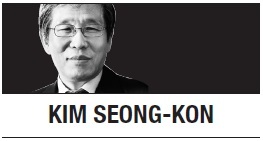 The 2017 Seoul International Forum for Literature, held by the Daesan Foundation and Arts Council Korea from May 22 to Thursday, brought together 14 international writers and 36 Korean writers to celebrate world literature. While attending the forum, I had the chance to learn many valuable things from the participating writers’ presentations.
The 2017 Seoul International Forum for Literature, held by the Daesan Foundation and Arts Council Korea from May 22 to Thursday, brought together 14 international writers and 36 Korean writers to celebrate world literature. While attending the forum, I had the chance to learn many valuable things from the participating writers’ presentations. In the “Perceiving Us and Them” session, Yu Hua, a famous writer from China, said, “I grew up during the Chinese Cultural Revolution. At the time, the ‘us and them’ dichotomy was clearly one of opposition. ‘Us’ meant the proletariat and ‘them’ meant the bourgeoisie.”
He continued, “When I was growing up, I harbored a deep antagonism toward capitalism. In reality, I didn’t know what capitalism was. My antagonism had been impressed upon me entirely through my education. The United States, as the leader of the capitalist world, bore the brunt of my antipathy.” Young Yu Hua was shocked and appalled later when he saw a big photo of Chairman Mao shaking hands with US President Richard Nixon in the newspaper. Political propaganda is always devious.
While mentioning the Chinese propaganda at the time, Yu Hua amused the audience by saying, “Every day, the Chinese propaganda machine told us the American people were living in great misery. I understood this to mean that Americans were all walking around in tattered rags, their bodies nothing but skin and bones.” This is all too familiar, because the same propaganda is still being used by the two Koreas against each other.
Yu Hua concluded his insightful talk with an anecdote about his encounter with a chef. “How does one become a great writer?” the chef asked the writer.
“First, one must read great books,” answered the writer. “People who read great literature over a long period of time refine their tastes and their sensibilities. Second, while it is true that all books, including the great ones, have flaws, one must pay attention when reading not to the flaws but to the strengths. Other people’s flaws are none of our concern. But other people’s strengths can be invaluable to our growth.” Hearing this, I could not but help nodding in agreement. Unfortunately, however, we always try to find other people’s flaws, not their merits.
Then the chef told Yu Hua, “Cooking is the same. I always send my junior chefs to other restaurants so they can build up their skills. The ones who say the food at other restaurants is no good do not progress. The ones who appreciate the food elsewhere progress in leaps and bounds.” Regrettably, however, we always tend to disparage other countries, rather than trying to learn from them or appreciating them. We bluntly insist, “They’re not all that great! Ours is much better than theirs. There’s nothing we can learn from them.” Paradoxically, however, we call ourselves progressives.
Listening to Svetlana Alexievich’s presentation on the Chernobyl nuclear explosion was also an eye-opening experience. In her thought-provoking paper, the Belarusian Nobel laureate vividly delineates the suffering of the people who were exposed to deadly radiation that caused silent but brutal deaths.
According to Alexievich, when the nuclear reactor was burning, the light was so beautiful that it “seemed to cast a spell.” Therefore people, not knowing it was emitting deadly radiation, “would bring their children out to the balcony and watch the light.” Unfortunately, they all died of radiation a few days later.
Animals instinctively smell imminent death. Alexievich said, “I saw a shepherd try to lead his cows to the waterside to drink; the cows backed away, afraid to drink the water.” Humans, however, could not detect the danger. In her presentation, she said, “We continued living our daily lives. Young parents sat kids on their shoulders without so much as a cap on, bought them snacks and ice cream that had been laid out on street stall stands with nothing to cover them. Boys played soccer.” They all died later.
Alexievich exposed the dreadful truth, “In terms of the land area contaminated with radioactive nuclides, it comes out to 22 percent of Belarusian land, 13 percent of Austria, 6.3 percent of Ukraine, 5 percent of Sweden and Finland, and 1.6 percent of European Russia that was contaminated. Four hundred million people were exposed to radiation as a result of the Chernobyl nuclear accident.” According to her, only after 20,000 years have passed will people be able to return to Chernobyl.
If used well, a nuclear reactor may be beneficial. If it malfunctions, however, it will be a disaster for all of us; the invisible radiation will contaminate our food and drinking water, killing us silently. Our ideals such as democracy or socialism may be the same. If it breaks down, there will be chaos and disaster. Still, nobody would assume the responsibility. With nuclear weapons in the North, very old reactors in the South, and so many Chinese nuclear plants nearby, we are hopelessly exposed to potential, invisible danger that would destroy us silently and brutally, if things go awry. We should be constantly on the alert.
By Kim Seong-kon
Kim Seong-kon is a professor emeritus of English at Seoul National University and president of the Literature Translation Institute of Korea. He can be reached at sukim@snu.ac.kr. -- Ed.


















![[Today’s K-pop] Treasure to publish magazine for debut anniversary](http://res.heraldm.com/phpwas/restmb_idxmake.php?idx=642&simg=/content/image/2024/07/26/20240726050551_0.jpg&u=)